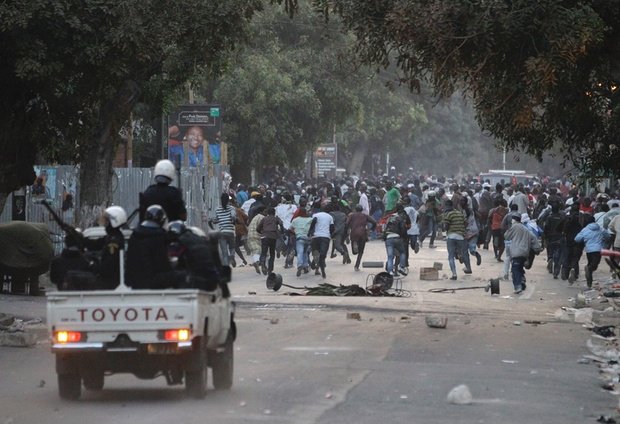Former Nigerian President Olusegun Obasanjo has arrived in Senegal to mediate the country's political standoff, while police once again fired tear gas to disperse protesters in the capital.
The demonstrators want President Abdoulaye Wade to step down, instead of running for a third term in this weekend's election.
Obasanjo said on Tuesday that his message was "this country is very beautiful, and nothing should be done to destroy it."
He is in Senegal as the head of a joint mission between the African Union and the Economic Community of West African States (ECOWAS).
An ECOWAS statement said Obasanjo's mission was "to engage all the political stakeholders in Senegal with a view to promoting dialogue and ensuring peaceful, fair and transparent elections."
Wade's camp said Obasanjo was welcome to observe the election but made it clear there was nothing to mediate.
Music icon and opposition activist Youssou Ndour was injured in the leg after being hit by a projectile at the scene of a banned rally in Dakar, his entourage said.
"Youssou Ndour was injured in the left leg, he has been seen by a doctor, but he doesn't want to make a big issue out of it and we won't be giving any more comment," said Charles Faye, spokesman for Ndour's Fekke ma ci boole (I am
involved) movement.
Earlier, witnesses said police fired tear gas and opposition demonstrators hurled stones in central Dakar.
A few hundred yards away from Independence Square, policemen were locked in a standoff with a group of protesters headed by former prime minister Idrissa Seck, who is contesting the vote, and music legend Youssou N'dour, whose candidacy was rejected by the constitutional court.
"Dictatorship is going [on] in Senegal, because all the rights that are protected by the constitution and the laws of this country are being thrown out by this candidate," Seck said.
"This situation is the situation Mr Wade created in Senegal. He doesn't have the right to be a candidate in this election," N'dour said.
Hundreds of supporters gathered around the two opposition leaders' vehicles, chanting in Wolof, "Gorgui, na dem!" [Get out, old man], in reference to Wade who, at 85, is Africa's second oldest head of state.
Waving Senegalese flags and holding up placards, protesters screamed in Wolof, "Na Deem" [must go] and "Wade D'ena" [Wade is dead], and in French, ''Rend Toi" [you have to surrender] and La Revolution Senegalese. Pour Liberer Le Peuple [the Senegalese Revolution in order to free the people].
"By no means did this stand off with riot police relate to some of the worst aspects of violence in Senegal – particularly Dakar's suburbs – this past month," Al Jazeera's Andrew Simmons said.
"But it shows the determination of leading opposition figures and protest movements to converge on a symbolic focal point: Independence Square. There is every indication that the situation will escalate."
Violence
Six people have been killed in election-related violence so far. Opposition supporters have increasingly sought to defy bans on protests by the authorities, leading to cat-and-mouse street battles in the capital and other towns.
The EU election observer mission expressed "its concern over the interior ministry's ban on demonstrations", a statement said. It added that Senegalese law allowed for such demonstrations when they involve presidential candidates.
Some minor candidates have called for Sunday's vote to be delayed but most, including the leading opposition figures, have not, even though they say they will not recognise Wade's candidacy.
Wade's rivals say his candidacy is illegal because it breaches rules setting a two-term limit, and accused the octogenarian leader of backtracking on his own statements that he would not stand for re-election.
The president has argued that he is eligible to stand as the limits were added to the constitution after he had started his first term in 2000.



